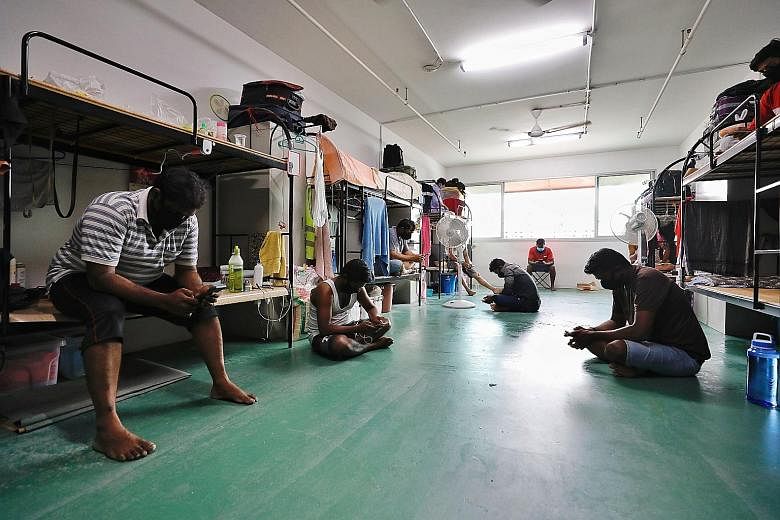About 20 purpose-built dormitories for foreign workers breach dormitory licence conditions each year, Manpower Minister Josephine Teo said yesterday.
This amounts to nearly half of the 43 such dormitories regulated under the Foreign Employee Dormitories Act (Feda), which together house some 200,000 workers.
An average of 1,200 employers a year are also punished for providing unacceptable accommodation for their workers, said Mrs Teo.
She was responding to questions from MPs, including Workers' Party MP Png Eng Huat (Hougang), who asked about the virus outbreak among foreign workers.
She told the House that accommodation standards for migrant workers have become better over the years, but acknowledged that further improvements could be made.
The living conditions in these large dormitories have been under scrutiny in recent weeks as the number of workers infected with Covid-19 rises.
"We will see how standards can be raised, but keep in mind there are also older dorms which perhaps might not have reached these standards yet,"said Mrs Teo, after showing MPs pictures of living conditions in newer dormitories.
The minister said that when lapses are found, these must be rectified immediately. Dorm operators can be fined up to $50,000, jailed for up to a year for such offences, or both.
For other housing types, employers can be fined up to $10,000, face a jail term of up to one year, or both, under the Employment of Foreign Manpower Act.
She pointed out that her ministry has about 100 dormitory inspectors who work under the supervision of the Commissioner for Foreign Employee Dormitories, two Deputy Commissioners and eight Assistant Commissioners.
Last year, these officers conducted 1,200 inspections and 3,000 investigations across the different housing types in which foreign workers in Singapore are accommodated.
Apart from the 200,000 workers housed in large dormitories, there are about 95,000 workers living in 1,200 factory-converted dormitories. Most of these workers are from the construction, marine and process sectors.
Another 20,000 workers are housed in temporary quarters on construction sites.
There are also 85,000 work permit and S Pass holders from the construction sector who live in HDB flats, private residential premises, and other sites.
Purpose-built dormitories have to comply with regulations under Feda, which has requirements such as for recreational facilities to be provided, as well as amenities like minimarts and Wi-Fi in common areas, said Mrs Teo.
Smaller accommodation-types not covered under Feda have to comply with regulations under different agencies, she added.
While the Covid-19 situation in large dormitories is "largely stable now", the situation in factory-converted dormitories and quarters on construction sites presents a mixed picture "and (is) taking up much bandwidth".
She told MPs that Singapore has a responsibility to its migrant workers, many of whom have made personal sacrifices to come to work in Singapore and contributed to its development.
"We will do everything within our means to make sure that they too win the fight against Covid-19, and reunite with their families in time to come," she said.












